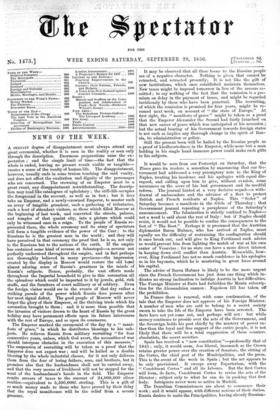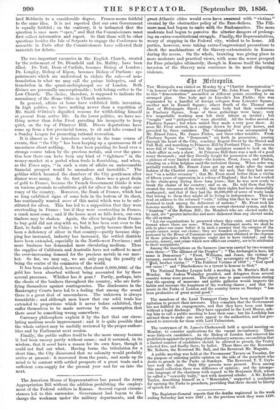It would be seen from our Postscript on Saturday, that
the Times gave its readers a sensation by announcing that our Go- vernment had addressed a very peremptory note to the King of
Naples, treating his insolence and his apologies with equal dis- regard, and calling upon him to give, without evasion, some assurances on the score of his bad government and its needful reform. The journal hinted at a very decisive sequel—a with- drawal of ambassadors and the advance of a fleet to protect British and French residents at Naples. This " feeler " of
Saturday becomes a manifesto in the Globe of Thursday ; that Government journal repeating a paraphrase of the Saturday's announcement. The fulmination is strictly confined to Naples—
not a word is said about the rest of Italy : but if Naples should resist, it would not be possible to confine the consequences to the foot of " The Boot." Perhaps it is presumed that the Austrian diplomatist Baron Hubner, who has arrived at Naples, must equally see the difficulty of restraining the conflagration should
it once break out, and will give to King Ferdinand such advice
as would prevent him from lighting the match of war at his own crater of Vesuvius ; for no state can have a more direct interest in keeping down civil conflict than Austria. Meanwhile, how- ever, King Ferdinand has not so much confidence in his apologies as in his bayonets,' which he is mustering in great force around his capital.
The advice of Baron Hubner is likely to be the more urgent since the French Government has just done one thing which in- dicates no strong inclination to indulge Austria in her difficulties. The Foreign Minister at Paris had forbidden the Manias subscrip- tion for the Alessandrian cannon : Napoleon III has taken off the prohibition.
In France there is renewal, with some confirmation, of the tale that the Emperor does not approve of his Foreign Minister.
A number of men who are said to belong to a secret society sworn to take the life of the Emperor have been arrested. The facts have not yet come out, and perhaps will not : but while
secrecy continues to preside over the acts of the Government, and the Sovereign holds his post chiefly by the mastery of power ra- ther than the loyal and free support of the entire people, it is not likely that there will be a total suppression of these counter- absolutists, the secret societies.
Spain has received a " new constitution "—professedly that of 1845 ; only, it would seem, less liberal, inasmuch as the Crown retains greater power over the creation of Senators, the sitting of the Cortes, the chief post of the Municipalities, and the press. This is the event of the week in Spain ; but the act appears to be only provisional. It sweeps away Esparterism, with the " Constituent Cortes " and all its labours. But the first Cortes will form, de facto, Constituent Cortes to revise the acts of the Dictator ; subject only to what he can do in packing that first body. Intriguers never were so active in Madrid.
The Danubian Commissioners are about to commence their work ; and it would appear, with different notions of their duties. Russia desires to unite the Principalities, having already Russian-
ized Moldavia to a considerable degree. France- seems faithful to the same idea. It is not reported that our own Government is equally faithful ; on the contrary, it is intimated that the question is once more "open," and that the Commissioners must first collect information and report. So that there will be other questions besides the Isle of Serpents to engage the Conference to assemble in Paris after the Commissioners have collected their materials for debate.



























